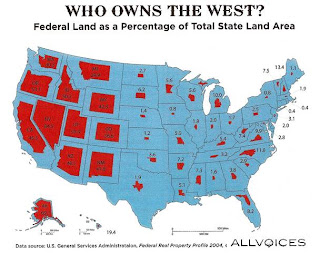Free federal lands to release Nevada's entrepreneurs and spur economic growth
Derek Yonai, an economics professor at Campbell University, had a great op-ed in Sunday's Las Vegas Review-Journal on how freeing Nevada's lands from federal control would increase economic growth in our state.
The federal government owns approximately 85 percent of Nevada's land, preventing the state from developing those lands to improve its economy and allow for job creation.Read the whole thing here.
With just 15 percent of the state left to its people for potential private development, Nevadans are restrained in realizing their entrepreneurial potential. Making due with only 15 percent of one's resources would hinder anyone. Who can flourish on 15 percent of their present assets? ...
All of this federally owned land is "dead property," meaning it is not available for development and its value is not being realized.
To get a sense of how much "dead property" there is in Nevada, consider this picture.
If you're interested in freeing Nevada lands from federal control, NPRI's Geoffrey Lawrence has written on a couple of great pieces on this topic as well.
Thomas Mitchell at 4th St8 has also written extensively on this issue and had a great post in response to the above op-ed.
In an op-ed article in the Los Angeles Times earlier this year titled "Free the American West: Get the federal government off public lands that are of no national importance," Robert H. Nelson, who worked in the Interior Department from 1975 to 1993 and now is a prof in Maryland, explained rather succinctly why the federal stewardship is a problem:Read Mitchell's whole post for a telling quote from Daniel Webster and a stunning comparison about how much land the British government controlled before the American Revolution."Most public land decisions are made by two federal agencies, the U.S. Forest Service and the Bureau of Land Management, and involve matters such as the number of cows that will be allowed to graze, the areas available to off-road recreational vehicles, the prevention and fighting of forest fires, the building of local roads, the amount of timber harvesting, the leasing of land for oil and gas drilling, mineral rights and other such details. Outside the rural West, most such decisions are made by private landowners or by state and local governments. In the West, Washington acts as if it knows best."And they don't do a very good job of it, as those in the West can attest - massive wildfires, long delayed mining permits, grazing fees and water rights jerked about, roads closed at a bureaucratic whim.
It's time to free the West.






